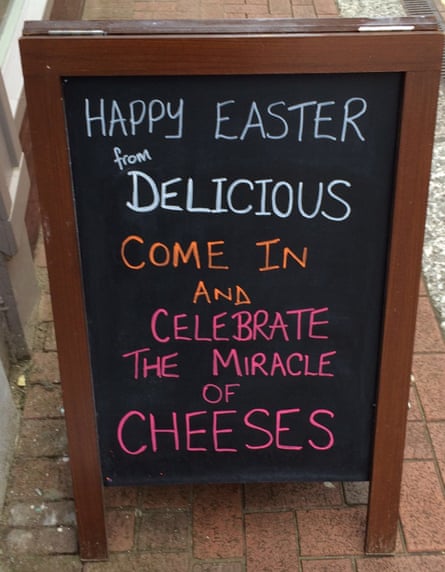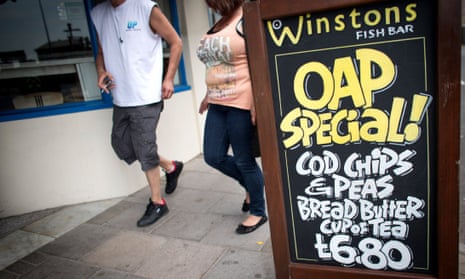Two weeks ago the Artillery Arms pub in east London was broken into. But instead of being disheartened, quick-thinking manager Tony Bennett decided to turn the situation to his advantage. Opening the pub as normal on Sunday morning, he wrote a sign on the pub’s outdoor sandwich board which read, “This pub is so good that someone tried to get in eight hours before we open!” and posted a photo on Facebook.
Media outlets quickly picked up the story, and it has been lauded as an example of great advertising.
Sandwich-board slogans then can clearly be an effective tool for small businesses, but is there a right or wrong way to use them?
Mick Quinn is the owner of the Fleming Arms pub on the Isle of Wight, whose billboards have become notorious in the area. Last year he found himself speaking to the police after one of his boards was labelled offensive, but Quinn, who has been managing the pub for nearly 12 years, says writing the topical slogans has completely changed his business and increased footfall.
“We usually have three or four signs outside the pub. I have a bit of a twisted sense of humour, so if something tickles me in the news during the week I’ll often turn it into a sign,” he chuckles. “The one that really kicked it off was to do with the prime minister’s time at university, which read, ‘Animal lover Cameron loses pig farmers’ vote’. Someone phoned the police and complained about it.”
Quinn claims his boards are “the greatest bit of advertising we’ve ever had”.Brick Lane Coffee, an east London-based institution, is also not afraid to be controversial. In November it hit the headlines soon after it propped up its pavement chalkboard-sign on a rainy Wednesday afternoon.
“Sorry no Uggs (slag wellies),” it read. While the café is no stranger to controversy (its sister shop in south London is called Fuckoffee), this little sign sparked the ire of Times columnist Caitlin Moran and was subsequently heavily criticised on social media.
“So there’s a shop in East London - @fuck0ffee - with this sign, insulting any woman pointing out how horrible it is,” wrote Moran, while other Twitter users called it out as being “sexist” and “awful”.
However, a spokesperson for the shop claimed that: “All this kind of faux outrage does is give us further publicity.”
Despite their current guise, according to the Encyclopædia Britannica, the sandwich board has been a popular form of advertising since the 19th century, when men would be hired to carry around signs to promote goods and services. While sandwich boards temporarily disappeared from the streets during the early-20th century, the Great Depression brought them back into popularity due to their inexpensiveness.
Interestingly, sandwich boards were also banned from streets in the West End of London in 2008, as part of plans to smarten up the area. Councillor Daniel Astaire said at the time: “The West End is a world-class destination with 3.5 million visitors every week and these cheap and tatty signs have no part in its future.”

However, Carl MacShilton, who is the owner of Delicious, a delicatessen in Weymouth opened his business in August last year and has found that his sandwich boards go down well with customers.
“Sometimes we have people taking pictures of them and sharing them on social media which is always great,” he says. “My favourite has been to do with cheese – ‘Happy Easter from Delicious. Come in and celebrate the miracle of cheeses’.”
MacShilton advises other small businesses to use their sense of humour and be “funny without being false” if they’re thinking about using sandwich boards.
“We’re on a street full of independent shops so there’s a hell of a lot of boards. A place across the road from us has got four on at the moment. We manage to stand out by being a bit different and using new ideas. I’d also say to make sure they’re legible. I get someone with nice handwriting to do ours.”
Unlike Quinn and Jones, MacShilton stays away from overly controversial themes on his signs, as his business is family-friendly. “We’re on a street that leads down to the beach so we get a lot of kids, and so we don’t use swearwords on the board,” he says. “But I do think you can play it too safe. Our cheese one might have offended a few Christians, for instance, but we still did it. These signs work if they create a reaction, and if you’re a pub you can probably get away with more.”
Graeme Douglas, CEO of advertising agency TBWA\London, agrees that pubs can get away with being more controversial. “Would I want my law firm, estate agent or dentist behaving in a risque manner? Probably not. But were it my tailor, local pub or record shop I’d probably be more relaxed about it.”
In an age of ad blockers, he also points out that outdoor advertising has no filtration (beyond closing one’s eyes). “As such it could be argued that it’s the last great broadcast medium: a surefire way of getting your message to a large chunk of people very quickly,” he says.
“Being creative with your message is essential – in a world where every brand and business wants consumers to pay attention you have to out-think, rather than out-spend, your competition.”
Joel Jelen, director at Reset Breathing in Liverpool, which offers therapy sessions to help people retrain how to breathe correctly, felt the health and wellness industry had a tendency to be “a bit too serious and earnest”. Her billboards tend to feature philosophical quotes or humorous phrases.
She says: “I just thought, there’s so much creativity in food marketing, why not look at the why in which a man or woman on the street runs an independent café and how do they make customers smile and engage with them? We help people who’ve got anxiety issues and so it goes on, it’s pretty heavy stuff – you’ve got to make people smile a bit. Our signs are either really dry humoured or philosophical, taking a little look at life in a less than serious way.”
Sign up to become a member of the Guardian Small Business Network here for more advice, insight and best practice direct to your inbox

Comments (…)
Sign in or create your Guardian account to join the discussion